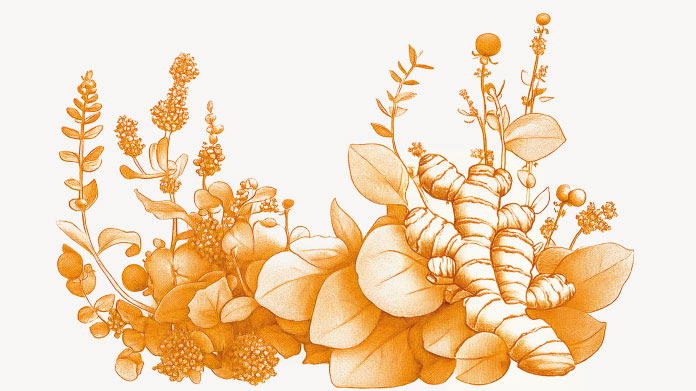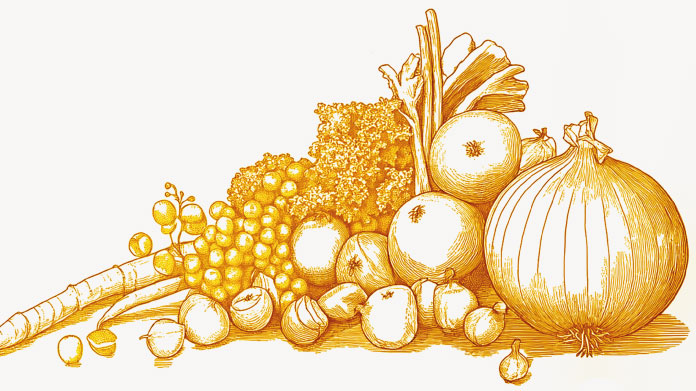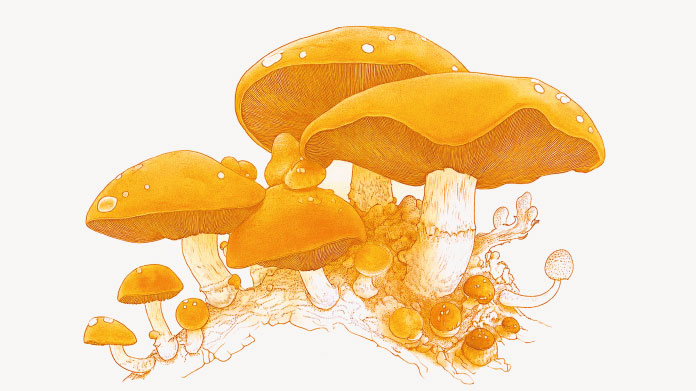Respiratory health: 7 natural cough remedies
Do you regularly suffer from a dry or productive cough, occasionally or persistently, daytime or night-time? Here are 7 natural cough remedies, excellent for supporting your respiratory health.

What exactly is a cough?
A sudden, loud exhalation of air from the lungs, a cough is a sign that the airways are irritated. It’s actually a natural defensive reflex designed to expel mucus and/or irritants of the throat, windpipe, etc. (1)
A cough can thus have a number of origins: while most are caused by viral infections, allergies, and pollution, acid reflux and numerous other factors can trigger a cough. Natural remedies should therefore be selected according to the cause of the cough.
And it goes without saying that if you have a persistent, troublesome cough, it’s essential to seek medical advice.
The tried-and-true hot toddy with honey
A universal and multi-beneficial remedy as old as the hills, a hot toddy with honey (with or without alcohol) always brings some welcome warmth and a feeling of well-being when you’re suffering from a cough, especially an irritable night-time cough (2).
So, to increase your chances of a peaceful, cough-free night, how exactly do you make a hot toddy? Simply add two spoonfuls of honey to a mug of hot water, plus one or two slices of lemon, and an optional 1-2cl of rum, and then take yourself off to bed!
Easing a cough by inhaling essential oils
Inhaling essential oils is another traditional remedy widely shown to be effective at relieving the airways. It soothes irritated mucous membranes and the steam makes it easier to breathe.
All you do is take a bowl of just-boiled water, add a few drops of essential oil (4 or 5 is usually enough), place a towel over your head to trap the steam, and with your face just above the bowl, breathe slowly until the water has cooled and there is no more steam (3).
The most common choices are essential oils of lavender, mint, eucalyptus, thyme and maritime pine.
Maritime pine and turmeric for respiratory health
Rich in proanthocyanidins, flavonoid compounds with antioxidant activity thought to be greater than that of, amongst others, vitamin C, maritime pine bark is recognized for its beneficial effects on the respiratory tract (4).
Meanwhile turmeric has been used for thousands of years in Ayurvedic medicine. With a high content of the powerfully antioxidant phenolic compounds curcuminoids, it is recognized for its ability to support the immune and respiratory systems(5).
Using these two plantssynergistically (by taking the supplement Lung Detox, for example) is therefore extremely helpful at dealing with a cough.
A rub of menthol or mustard on the throat
Our grandmas clearly had everything they needed to treat a cough naturally! Another key feature of their natural ‘toolbox’ were rubs or poultices made from menthol, eucalyptus or mustard, remedies which anyone under 20 has probably never heard of (6).
But again, the principle is simple: rub the chest and/or throat with a neutral oil containing either a few drops of essential oil of menthol or eucalyptol, or some mustard powder. This acts as a decongestant for the airways and therefore helps to relieve a cough.
A vegetable juice to help counter over-secretion
Sometimes used to help detoxify the liver, black radish is also known to be a good natural cough remedy.
Rich in isothiocyanates, glucosinolates and raphanin, black radish juice is believed by some naturopaths to combat hypersecretion in the upper respiratory tract due to winter ailments such as colds, sinusitis, etc. (7)
To make the juice more palatable, try adding ginger and lemon which also bring their own benefits.
Effective plants for allergic coughs
As mentioned in our introduction, coughs can have many origins, so a specific natural remedy is sometimes called for, such as when the cause is an allergic one:
- astragalus, an adaptogen plant which supports general well-being and a healthy immune system (8);
- maritime pine, with the benefits mentioned above;
- spirulina, rich in vitamins and antioxidants which helps to support the immune system(9) ;
Synergistic use of these plants (such as in the supplement Aller Fight for example), provides maximum benefit from their properties and helps to regulate the body’s defenses against airborne allergens (pollen, dust, mites, etc.)
In addition to allergens, pollution can often cause coughs (indeed, air pollution is thought to be responsible for one in five deaths globally) (10).
Fragrant verbena to support physical well-being, rosemary for immune health, as well as olive and Sophora Japonica: using these plants synergistically (as in the supplement Zeropollution) is an excellent way of boosting the body’s resistance to external aggressors (11-12).
Cough relief from herbal teas
Last but not least, another traditional cough remedy: herbal teas! Opt for rosemary, which, as mentioned, supports immune health, thyme, a recognized anti-bacterial with proven efficacy against bronchitis and coughs, and borage, which is believed to have anti-inflammatory and humectant effects making it an effective aid to soothing irritating, dry coughs (13).
You can, of course, always add a spoonful or two of honey to your tea to maximise its effects and increase its soothing effects even more ...
References
- CHUNG, Kian Fan, BOLSER, Don, DAVENPORT, Paul, et al.Semantics and types of cough. Pulmonary pharmacology & therapeutics, 2009, vol. 22, no 2, p. 139-142.
- COHEN, Herman Avner, ROZEN, Josef, KRISTAL, Haim, et al.Effect of honey on nocturnal cough and sleep quality: a double-blind, randomized, placebo-controlled study. Pediatrics, 2012, vol. 130, no 3, p. 465-471.
- HORVÁTH, Györgyi et ÁCS, Kamilla. Essential oils in the treatment of respiratory tract diseases highlighting their role in bacterial infections and their anti‐inflammatory action: a review. Flavour and Fragrance Journal, 2015, vol. 30, no 5, p. 331-341.
- COS, P., BRUYNE, T. De, HERMANS, N., et al.Proanthocyanidins in health care: current and new trends. Current medicinal chemistry, 2004, vol. 11, no 10, p. 1345-1359.
- PANAHI, Yunes, GHANEI, Mostafa, HAJHASHEMI, Ali, et al.Effects of curcuminoids-piperine combination on systemic oxidative stress, clinical symptoms and quality of life in subjects with chronic pulmonary complications due to sulfur mustard: a randomized controlled trial. Journal of dietary supplements, 2016, vol. 13, no 1, p. 93-105.
- GRAHAM, DOUGLAS. The Effects of Warm Douches, Massage and Friction upon the Expansion of the Lungs. The Boston Medical and Surgical Journal, 1894, vol. 131, no 23, p. 559-561.
- LUGASI, A., DWORSCHÁK, E., BLAZOVICS, A., et al.Antioxidant and free radical scavenging properties of squeezed juice from black radish (Raphanus sativus L. var niger) root. Phytotherapy Research: An International Journal Devoted to Pharmacological and Toxicological Evaluation of Natural Product Derivatives, 1998, vol. 12, no 7, p. 502-506.
- CHO, William Chi Shing et LEUNG, Kwok Nam. In vitro and in vivo immunomodulating and immunorestorative effects of Astragalus membranaceus. Journal of ethnopharmacology, 2007, vol. 113, no 1, p. 132-141.
- KHAN, Zakir, BHADOURIA, Pratiksha, et BISEN, P. S. Nutritional and therapeutic potential of Spirulina. Current pharmaceutical biotechnology, 2005, vol. 6, no 5, p. 373-379.
- https://www.santepubliquefrance.fr/les-actualites/2021/pollution-de-l-air-l-oms-revise-ses-seuils-de-reference-pour-les-principaux-polluants-atmospheriques
- LENOIR, Loïc. Effet protecteur des polyphénols de la verveine odorante dans un modèle d'inflammation colique chez le rat. 2011. Thèse de doctorat. Université d'Auvergne-Clermont-Ferrand I.
- AL-SEREITI, M. R., ABU-AMER, K. M., et SENA, P. Pharmacology of rosemary (Rosmarinus officinalis Linn.) and its therapeutic potentials. 1999.
- DAUQAN, Eqbal MA et ABDULLAH, Aminah. Medicinal and functional values of thyme (Thymus vulgaris L.) herb. Journal of Applied Biology & Biotechnology, 2017, vol. 5, no 02, p. 017-022.
Keywords
3 Days
Quick shipping
Quick shipping; good price. No issues!
Mary McCarty
5 Days
Thr product is very good and is helping…
Thr product is very good and is helping me on my health. Then is always on time
LUGO Luz
7 Days
Buying was fine
Buying was fine. I had problems with the website not recognizing my login info, and had to call to get it fixed. Other than that, everything was good.
David S. Clark
8 Days
Your super maca and super ginseng are…phenomenal
Your super maca and super ginseng are phenomenal supplements that compliment each other when taking them together. Fantastic feeling of well-being and lots of mid day energy without the crash.
Keith Mason
10 Days
I have had amazing results with every…
I have had amazing results with every supplement I've purchased. I am extremely satisfied with this company
kirstin Torres
10 Days
Fine products
Fine products . They are on the leading edge of online supplements. The only issue -so far-is they sometime run out of subscription items.
Jason Argos
13 Days
The ordering process is very user…
The ordering process is very user friendly and the products always come in a timely manner.
CARTER Rhonda
14 Days
The price for Dr
The price for Dr. Pero's AC-11 is reasonable and in line with his views. (my former colleague). Keep it pure.
CAMPBELL Clayton
17 Days
Right on every time.
Right on every time.
Arthur Nicholas
20 Days
They are cheaper than everyone else and…
They are cheaper than everyone else and the shipping was fast. Great company.
Patricia Adams
27 Days
Availability of quality health…
Availability of quality health supplements and it's wide variety is impressive. Ordering is seamless and shipping even during the holidays is well streamlined.
Mohamad Hussein
41 Days
A Product worth waiting for when not…
A Product worth waiting for when not available and then arriving as a surprise!
DOMINIC
42 Days
On time shipping
On time shipping
GEORGE Verne
44 Days
Ordering was easy and the product was…
Ordering was easy and the product was delivered with no problems. Appreciated that I was notified when it would arrive. Thanks!
MascarC
50 Days
Great customer service - responsive …
I ordered from them and my item was unavailable for sometime. I was super happy when they reactivated my order and shipped my item which arrived very quickly. Great customer service.
Ruth Rueter




